Your customers are talking. Are you listening?
In our survey of 750 people across Germany, Austria, Switzerland, France, and Italy, we uncovered how significantly online reviews influence consumer choices and behaviour.
This article dives into those findings. Learn how a single review can sway potential customers and how a strategic response can make a world of difference. By understanding these insights, you’ll be equipped to harness the full potential of online reviews, making them a pivotal part of your business success.
Insight #1: the trend of checking business reviews shows no sign of slowing down
Online reviews are nothing new (TripAdvisor has been around for over 20 years!). But for both businesses and consumers, they’re as relevant as ever.
Our survey revealed telling statistics about how often people turn to online reviews, shedding light on their role in shaping consumer behaviours. Here’s what we found:
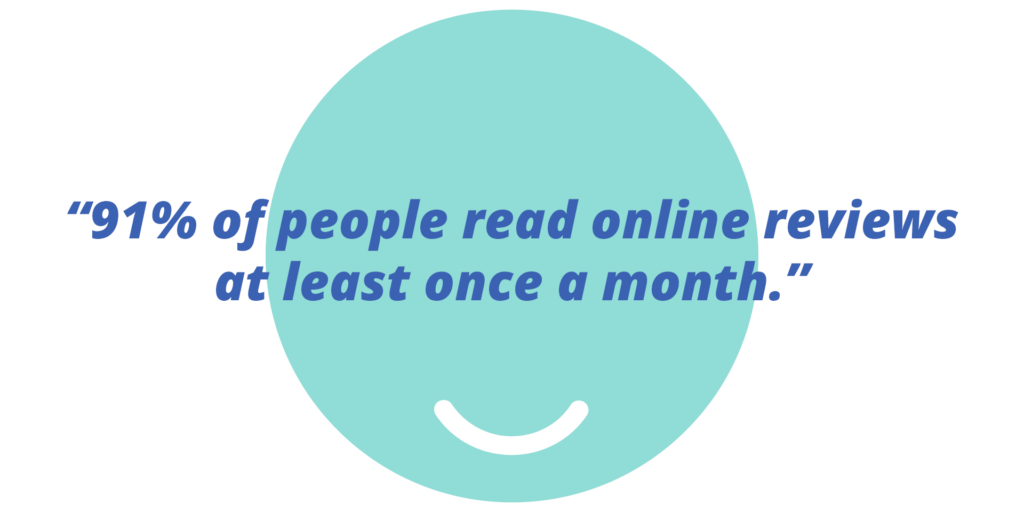
- 91% of people read online reviews at least once a month. This high level of engagement emphasises the importance of actively managing your online reputation.
- 52% of respondents revealed they read reviews several times a week.
- 24% read reviews every single day. For some, reading reviews is as routine as checking the news or social media.
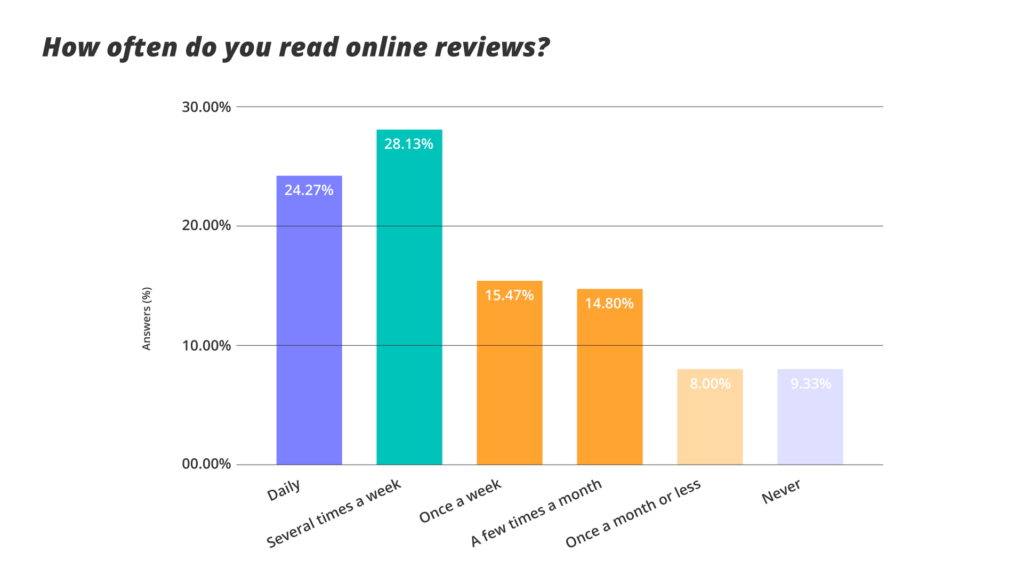
Key takeaway: consistently collecting new reviews should be part of your marketing strategy
When online reviews hold significant sway, it’s important to collect them regularly. Fresh reviews show how your business is performing right now and make sure potential customers get the latest information.
They also give you a real-time view of your customer experiences, which is vital as preferences and expectations evolve.
Encourage your customers to share their experiences and strive to provide service so good it’s worth talking about. This way, you’ll build and maintain a strong, attractive online presence that resonates with both new and existing customers.
Marketing teams are increasingly being asked to do more with fewer resources, so adding a customer review initiative may feel like a tall order. But the good news is, you don’t have to go it alone. As our CEO, Steffen Schmickler, explains:
“Collecting continuous and consistent feedback is the basis for increasing the value of your customer relationship. Implementing this at scale at multiple touchpoints of the customer journey can only be done through automation and seamless integration of feedback management systems with PMS and CRM systems.”
Insight #2: most people’s purchasing decisions are influenced by online reviews
When deciding where to spend their money, people look to online reviews as a source of truth. They capture real customers’ opinions and experiences, providing an honest snapshot away from flashy company websites and targeted ad campaigns.
Our survey provides compelling statistics that highlight how much influence reviews hold on consumer decision-making. We found:
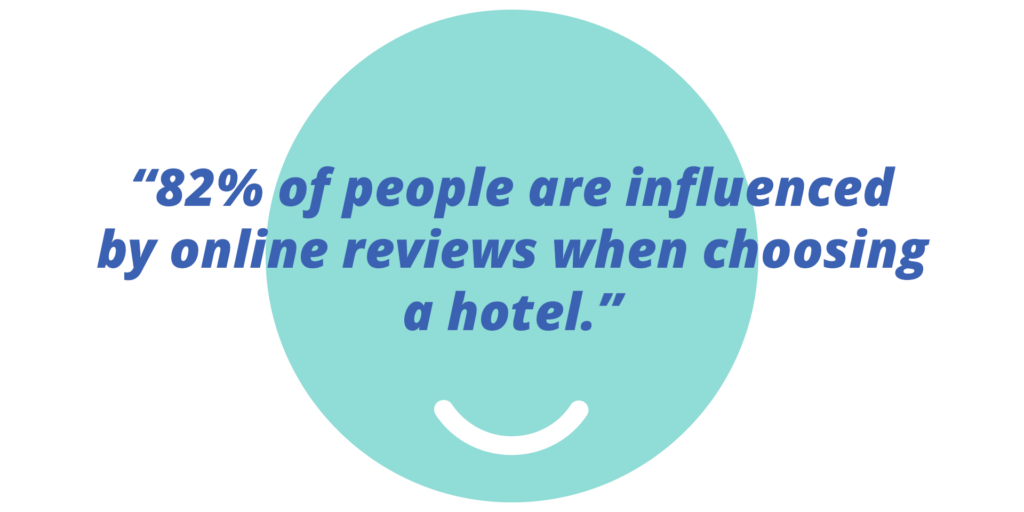
- 82% of people are influenced by online reviews when choosing a hotel. In a sector where the guest experience is everything, hospitality businesses can’t underestimate the impact of a solid review strategy.
- 76% of people are influenced by online reviews when choosing a doctor. Reviews are a vital source of information about the quality of care and patient experiences.
- 79% of people are influenced by online reviews when choosing a local business. Don’t rely solely on real-life recommendations. Today’s customer checks online opinions too.
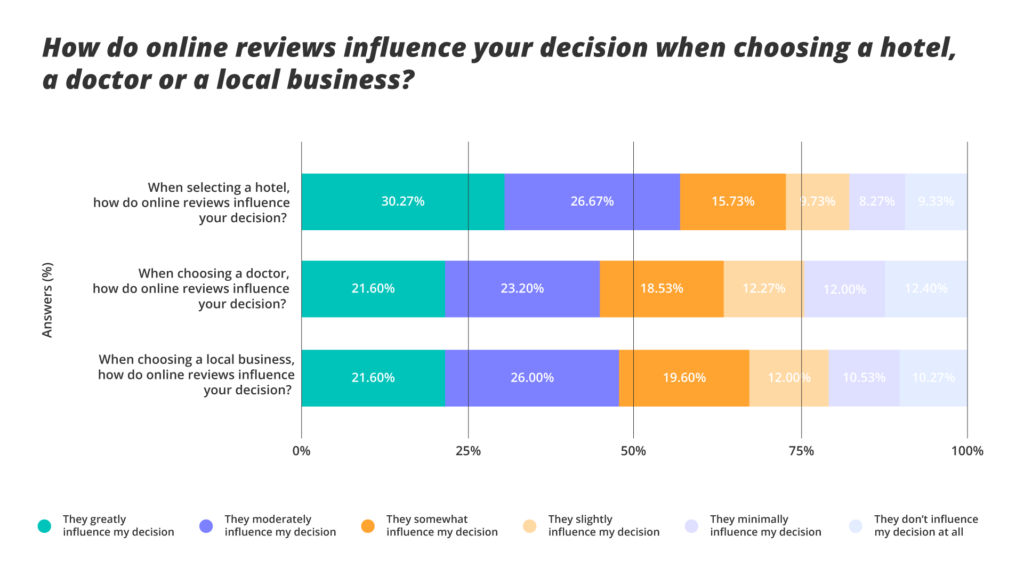
Key takeaway: focus on increasing good reviews for a competitive advantage
Online reviews are more than just opinions; they’re powerful decision-making tools.
Use the information from reviews to continuously improve and adapt your services. Engage with your customers, seek feedback proactively, and address concerns from your reviews to build trust.
When consumers rely heavily on the experiences of others, having consistently high-quality reviews can tip the scales in your favour. By prioritising customer experience and actively managing your online presence, you can transform your reviews into a competitive advantage. As Steffen explains:
“Reviews are the digital word-of-mouth. As much as we are in general influenced in our buying decisions by positive recommendations of people we know, we rely on verified and trusted reviews in the online world. It’s a powerful mechanism which you have to manage thoroughly because it can create huge benefits but also turn against you.”
Insight #3: consumers are willing to pay more for businesses with positive reviews
Positive online reviews don’t just influence whether customers choose you – they also impact how much customers spend.
Our survey reveals:
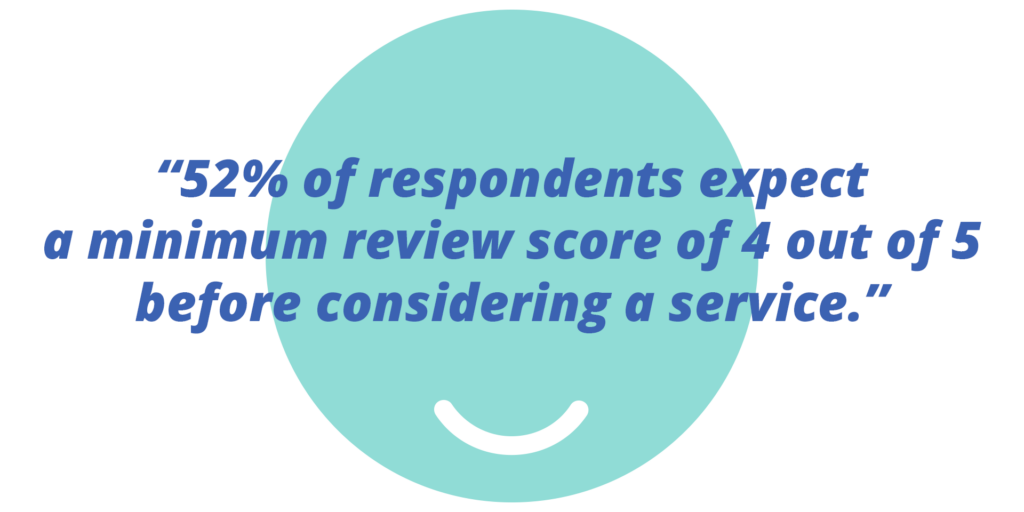
- 46% of people are willing to pay more for a service at a local business that has received positive online reviews. A strong review strategy can give you a good return on your investment.
- 52% of respondents expect a minimum review score of 4 out of 5 before considering a service. This expectation sets a high bar for businesses, underscoring the importance of not just gathering reviews but achieving high ratings.
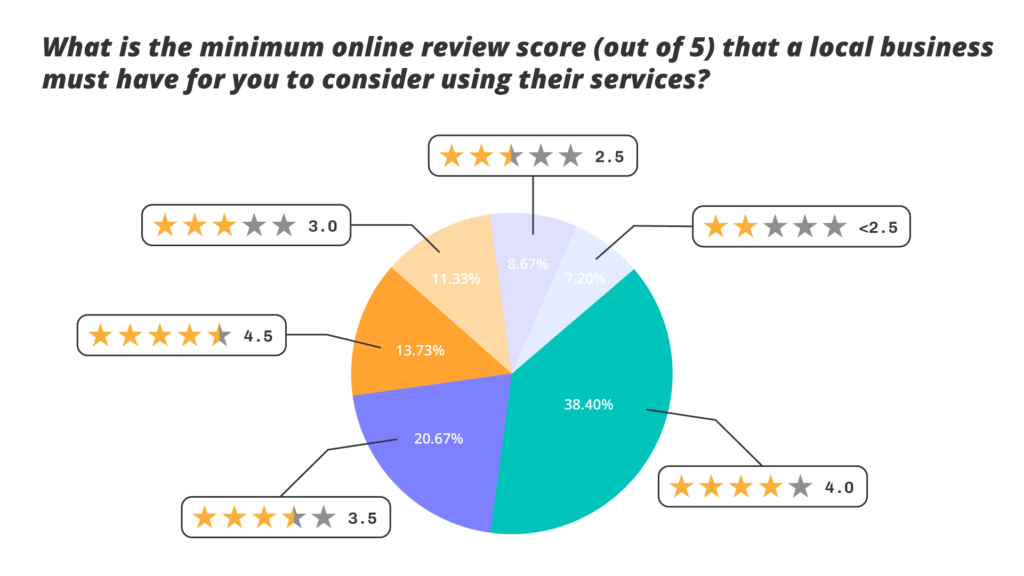
Key takeaway: implement a review strategy to increase your revenue
The days of passively waiting for reviews to come in are over. Taking an active approach to generating and managing reviews is essential for businesses aiming to maximise their revenue potential.
This strategy could include review management software, but also creating processes that encourage positive customer feedback and engagement. For example, you could implement follow-up communication post-purchase, inviting customers to leave a review. You might train staff to encourage reviews during customer interactions.
By integrating these strategies, you can significantly influence the volume and quality of your reviews. As Steffen explains, this can have a direct impact on your brand perception, and in turn, your revenue potential:
“Verified and trusted reviews are the hard currency of the internet. Collecting positive reviews, addressing negative reviews and improving your overall rating on key platforms will result in significant improvements of your core KPIs like ADR, OCC or RevPAR.”
Insight #4: replying to reviews is more important than you might think
When you respond to a review, whether it be positive or negative, you show you value your customers’ feedback. It’s not just a nice thing to do, it helps you build relationships, foster trust and encourage customer loyalty.
Our results are telling: the majority of consumers expect and value engagement from businesses. Here’s what our survey uncovered:
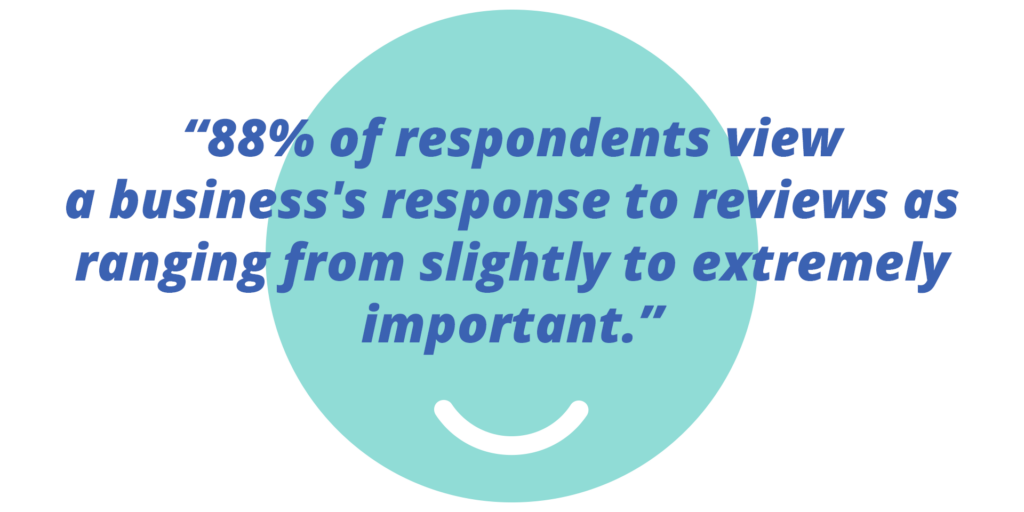
- 88% of respondents view a business’s response to reviews as ranging from slightly to extremely important. This overwhelming majority shows that replying to reviews isn’t just a preferred practice. Your customers expect it as a part of good service.
- 70% of people state that a business’s responses to reviews impact their purchasing decision. Replying to reviews has a knock-on effect on potential customers.
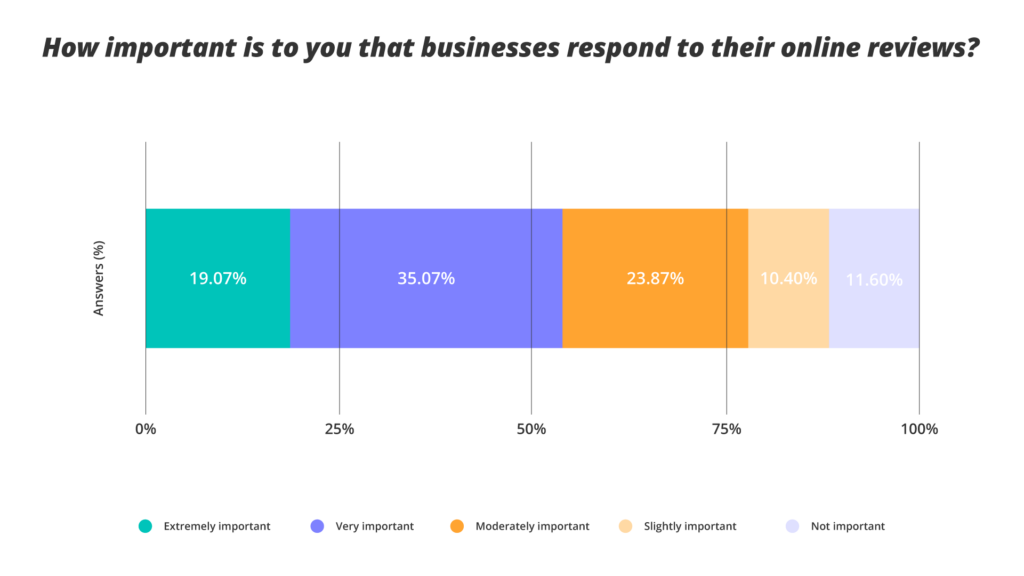
Key takeaway: put systems in place to reply to reviews quickly and efficiently
Responding to reviews has many benefits for your business. So why is it something that happens so rarely? One of the main challenges is the time it takes to manage and reply to reviews properly.
It’s difficult to keep up with the influx of feedback, especially for multi-location businesses. Plus, creating appropriate, personalised responses for each review requires effort and thoughtful strategy.
To streamline this process, consider implementing review management software, which allows you to respond to all reviews from a central platform. Or, you could develop a structured workflow for your team, providing clear guidelines for handling positive and negative feedback. Training staff in effective communication and empathy is also crucial to ensure responses are timely, meaningful, and helpful to customers.
With systems like this in place, responding to reviews can shift from an irregular task to a regular, strategic part of your business operations. To make it even more convenient, Steffen advises making use of the latest tech innovations:
“Managing reviews across multiple platforms is cumbersome and inefficient. Monitoring all reviews in one place and using AI-based tools to answer reviews is making the lives of marketing and reputation managers much easier and frees up time to focus on other topics.”
Pro tip 💡 Customer Alliance’s AI Reply Assistant drastically reduces time spent replying to reviews while generating consistently high-quality, personalised responses. Try the interactive demo to see it in action.
Make 2024 the year you harness the power of reviews
Good reviews aren’t just nice to have. They’re a powerful tool for your business’s reputation and revenue. So if your reviews have fallen on the back burner, it’s time for a fresh look at your strategy.
Get into the groove of actively seeking out customer feedback, responding to each review with care, and using this goldmine of insights to improve your services. If you’d like a dedicated review and feedback management platform on your side, we’re here to help. Pick a convenient time for a quick introduction and let’s discuss your review challenges together.
Related reading:
- What are the benefits of review management software?
- How do I choose a review management software? A comprehensive guide
- How to get more 5-star reviews: the secret sauce for mid-sized businesses
- How many Google reviews do I need? (plus 8 foolproof ways to get them)
- 5 time-saving strategies for responding to online reviews
